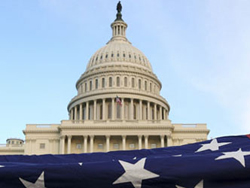U.S. Congress: reconciliation or continued bickering?
Just before Tuesday's big GOP wins, experts had forecast that the new Congress would likely be just as divided -- perhaps even more so -- than it has been over the last two years.
 |
But the day after the elections, a humbled Obama indicated willingness to cooperate with Republicans on tax cuts, after his party lost control of the House of Representatives and narrowly clung to the Senate. And that begs the question of weather Congress will continue to be divided, or weather the two parties will see more unity in the next two years.
"My goal is to sit down with Speaker-elect Boehner and Mitch McConnell and Harry and Nancy sometime in the next few weeks and see where we can move forward in a way that, first of all, does no harm," Obama said at a White House press conference on Wednesday.
The tone of the president's statements was a sharp turn from his pre-election message, which was essentially to urge voters not to return to what he called the failed policies of the previous administration.
Republicans' victory on Tuesday was spurred by voters' anxiety over a jobless rate that continues to hover near the double digit mark and one that may not return to pre-recession levels for years, or even a decade, some economists believe.
Many voters were disappointed that Obama's policies failed to boost employment and blamed the administration and the Democrat- led Congress.
Polls also show that many Americans are uneasy about the way the country is going and fret about the government's massive deficit.
While economists hold that Obama's 787 billion U.S. dollar stimulus bill prevented economic freefall into a second Great Depression, voters are angry that the bill did not create the jobs that the president said it would.
More partisan bickering ahead?
In spite of the president's statements on Wednesday, however, a number of issues lie ahead that threaten to widen the wedge that already exists between the two parties.
As the 2012 presidential elections loom, presidential candidates on the GOP side will appeal to what is likely a more conservative primary electorate and are less likely to cooperate with Obama, said John Fortier, fellow at the American Enterprise Institute.
Moreover, many incumbents who were voted out were centrists, which means the Democrats are more liberal and fewer in number.
 0
0 






